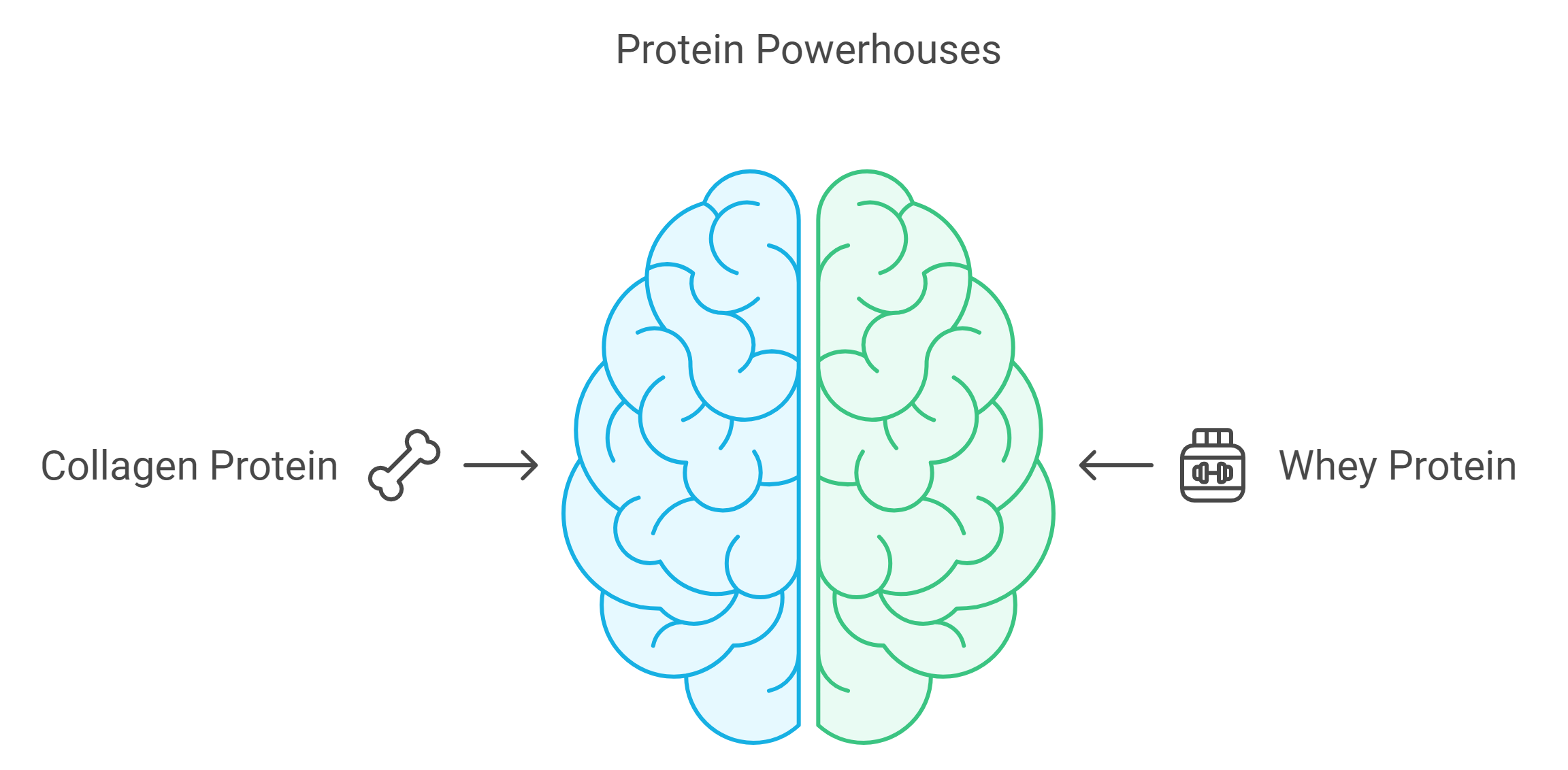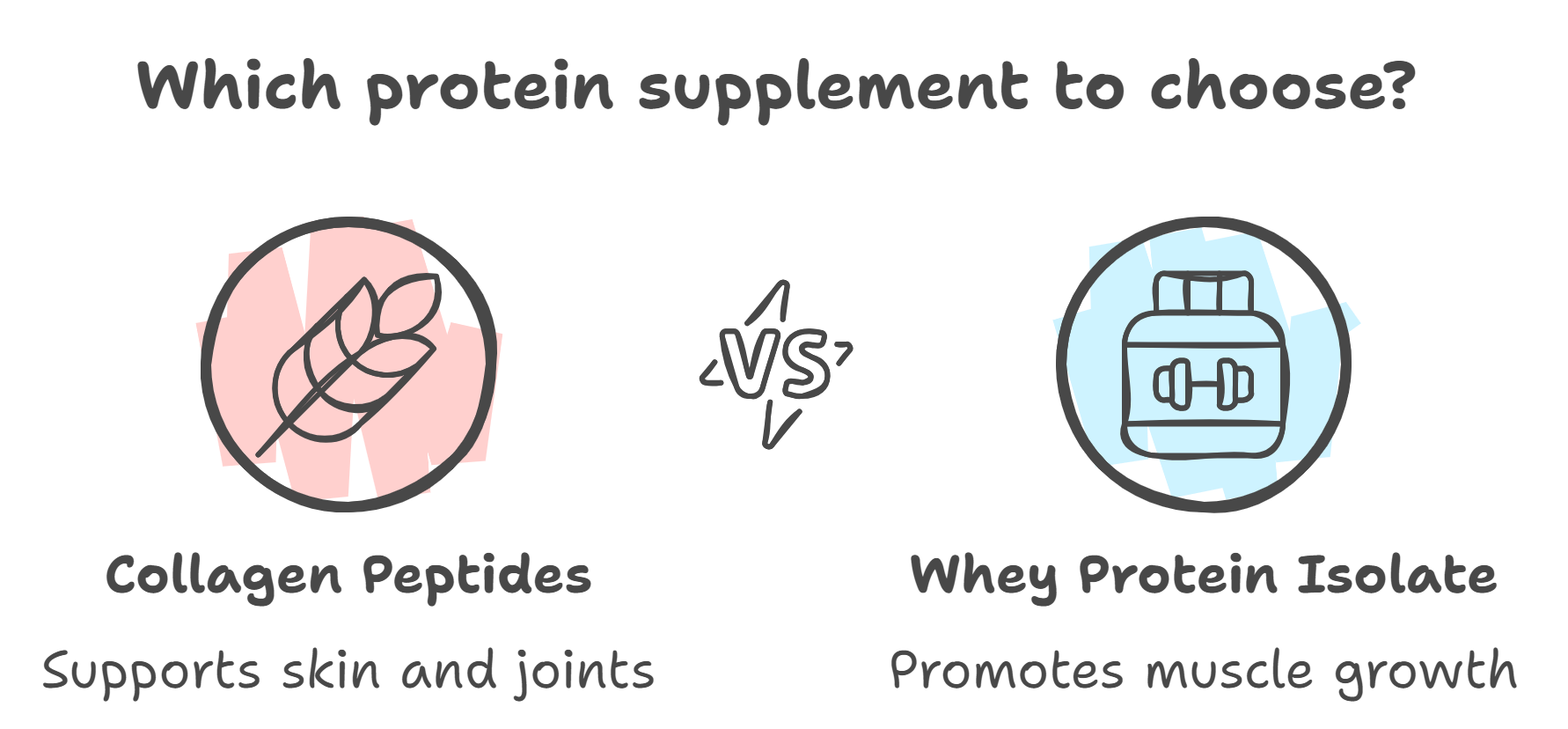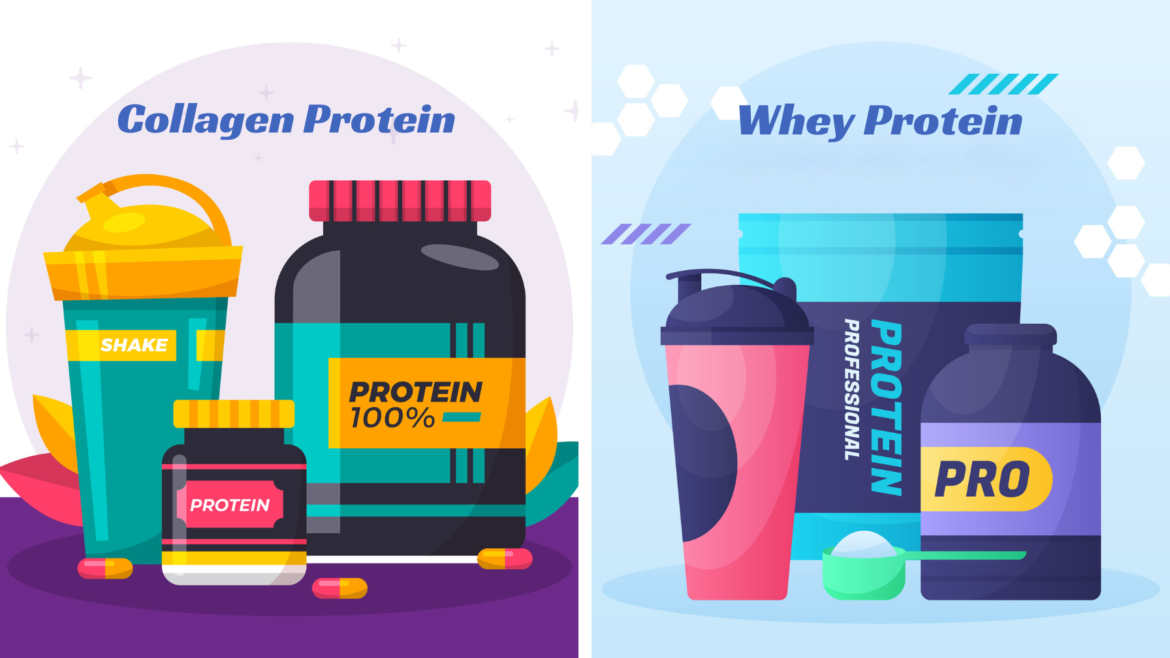Introduction
In the world of nutritional and fitness sports, protein supplements are one of the most important elements that help to build muscular mass, recovery and general health of humans. One of the many is also included in collagen protein and whey protein as brands or supplements.
But what is the real thing that distinguishes them? Herein, we discuss in depth the details around collagen protein and whey protein, their difference when it comes to nutritional composition, benefits to health, digestibility and whether using a combination of the two could give you the ideal results.
Introduction to Collagen Protein and Whey Protein
What is Collagen Protein?
Collagen is considered as the most abundant protein in the human body and acts as a vital player in the makeup of connective tissues, skin, bones, muscles and other organs. Collagen, which is derived from animal tissue that may be bones, cartilage, and skin, possesses an amino acid profile including glycine, proline, and hydroxyproline in its unique pattern.
In contrast to other protein sources, collagen is deficient in certain essential amino acids, especially tryptophan, and thus has to be complemented by a complete protein. In summary, it is much more than just a tool for energy and protein or a lack of different nutrients. Its beneficial effects on skin health, joint health, and muscle recovery are also the advantages of these nutrients.
What is Whey Protein?
Whey protein is a byproduct of the cheese production process, obtained from the liquid part of milk. It contains a complete amino acid profile including all the nine essential amino acids known to be catalytically important to human health.
Whey protein is known to absorb and digest minimally, so, it’s used by a lot of athletes and fitness lovers for muscle recovery after a workout session. In the same way, whey protein is high in branched-chain amino acids (BCAAs) especially leucine which is the key to muscle protein synthesis.
Nutritional Composition
Collagen Protein Composition
Collagen, as a protein, is comprised of many of the amino acids glycine, proline, and hydroxyproline that form the building blocks of stable and resilient connective tissues like the skin, ligaments, and tendons. On the other hand, it is short of some of the essential amino acids, like tryptophan, which play a major role in various biological functions.
Although collagen is an incomplete protein, its specialized amino acid composition permits such a lot, that it has discovered its application in beauty including joint and muscle health.
Whey Protein Composition
Whey protein is a complete protein source, containing all nine essential amino acids in optimal proportions. The branched-chain amino acids (BCAAs) are the main ones in it. (BCAAs) including leucine, isoleucine, and valine are the ones that are the most active in muscle protein synthesis, recovery, and repair.
Besides that, whey protein is fast absorbed and added quickly in the body, which makes whey a proper post-workout supplement for support of lean muscle mass building and recovery.

Health Benefits
Benefits of Collagen Protein
Collagen protein is an abundant protein with a multitude of health benefits, mainly because of its role in the support of connective tissues, skin, and joint health. According to the research, collagen supplementation is reported to boost skin elasticity, decrease wrinkles, and thereby, enhance the healing of wounds.
Also, collagen peptides help in maintaining healthy joint function and reduce the pain from osteoarthritis. Moreover, collagen’s function as a muscle repair and recovery aid makes it a must for athletes and those who are involved in exercise on a daily basis.
Benefits of Whey Protein.
Whey protein is legendary for its muscle-building effects as well as a number of positive health outcomes. Investigations have revealed that whey protein supplementation can boost muscle protein synthesis, stimulate muscle growth, and improve exercise performance.
Furthermore, scientific studies substantiate that whey protein is effective in supporting weight management by keeping people full for a long time and lessening cravings. Moreover, another remarkable point is that whey protein not only boosts the immune system but also supports good health and well-being in general.

Digestibility and Absorption
Digestibility of Collagen Protein
Collagen protein is recognized as the most important particular in that process because of its specific structural design: collagen protein hydrolysis is partial and the final product is called collagen peptides. These small peptides are easier to digest and absorb as compared to the major collagen protein “intact” collagen.
Hence, they are available instantly for various physiological functions. However, collagen has a limited amino acid profile which may affect its overall digestibility and utilization by the body.
Digestibility of Whey Protein
The bioavailability and the solubility of whey protein makes it very quick to digest and absorb compared to other types of proteins. Whey protein is readily broken down into amino acids upon digestion, which makes it possible to quickly transport protein to muscle tissues for protein synthesis and recovery.
This speedy digestion explains why whey protein is excellent for post-workout supplementation because it is considered the gold standard in muscle damage and repair.
Collagen Peptides vs Whey Protein Isolate
What are Collagen Peptides?
Collagen peptides, short chains of amino acids, are the outcomes of hydrolyzing collagen protein through enzymatic way management. The molecules of these peptides that are extremely bioavailable and soluble in water can be easily incorporated into dietary supplements and functional foods that have a large variety of sources.
Collagen peptides are the same as collagen protein in terms of amino acid composition and thus have the same health advantages for the skin, joints, and muscles.
Whey Protein Isolate
Whey protein isolate is a product where whey protein is subjected to a sort of processing to isolate lactose and fat, so what remains, in the end, is protein at a higher concentration. Whey protein isolate represents a rich source of proteins (high in solids and low in fats, carbohydrates, and lactose); thereby it is suitable for those combating lactose intolerance or those on low-carb diets.
The whey protein has been highly refined, retaining all essential amino acids and bioactive compounds present in the whey, making it a great choice for promoting muscle growth and recovery.

Can You Take Collagen and Whey Protein Together?
Compatibility of Collagen and Whey Protein
Many people are curious to know whether it is efficient to take collagen and whey protein together for the best results. Collagen and whey protein, however, are separate compounds, which though having various benefits are not supported using research as a basis.
Nevertheless, making sure that you intake both of them quality sources of protein will offer you complementary advantages in terms of total healthy development. Collagen protein can be very useful in connection with connective tissues, skin and joint health, as well as with whey protein which can support muscle growth, recovery and immune function. So, using collagen and whey protein together could give the body the range of interventions it needs for all its needs.
FAQs
Q: Is collagen peptide as effective as whey protein for muscle growth?
Studies show that collagen peptides may not be as powerful as whey protein for the enhancement of muscle protein synthesis and muscle growth because of their low leucine content and incomplete amino acid profile.
While all three collagen peptides provide different health benefits for skin, joints, and connective tissues, in muscle hypertrophy and recovery, whey protein is the preferred choice for those who are looking for a supplement that will give them the most muscle effectiveness.
Q: Can collagen protein replace whey protein in a post-workout shake?
Although collagen protein is known to have many health benefits, it may not be the best post-workout supplement compared to whey protein. Whey protein is one of the fastest digested and absorbed protein sources (delivering the fulfillment of essential amino acids), and for protein synthesis and recovery it travels to muscle tissues.
Finally, it comes to whey protein which plays a role in muscle repair and is very important for growth caused by exercise and then collagen protein that is responsible for the improvement of skin, joints, and connective tissues health.
Q: Is it safe to mix collagen and whey protein supplements?
Moreover, collagen and whey protein, when taken together, are generally safe and they do come in addition to offering better benefits for health and fitness in general. Collagen protein ensures the health of skin, joints, and connective tissues.
Moreover, it enhances muscle growth and recovery, as well as immune functioning. Hence, combining the two collagen and whey proteins will give your body a complete approach to serving its varied needs.
Q: Can collagen and whey protein be consumed together in recipes?
Yes, collagen and whey proteins can be added to different recipes due to their ease of incorporation which contributes to boosting nutrition. Collagen peptides and whey protein powder can be mixed with smoothies, baked goods, oatmeal, yogurt and other foods to increase the protein content in these foods and make them healthier.
In trying different combinations strive for your meal to be as tasty as possible in that it would provide you with both collagen and whey protein for your nutrition.
Conclusion
The mainline, collagen protein and whey protein build unique benefits for health and fitness in general. Collagen protein is the main component of the skin, joints and connective tissue, while whey protein is the key to muscle growth, recovery and immune boosting.
Whether you pick collagen, whey protein, or use them together, they help you dream about the way to your health and fitness goals. Be mindful of spreading your food intake evenly, complementing it with exercise and providing health enhancement through sufficient hydration for better efficiency.

Curtis Walcker
Supplement Consultant
Hey there! I’m Curtis Walcker, a dietary supplement expert with a passion for all things fitness and nutrition. Armed with a Master of Science degree in nutrition. I’ve spent years diving into the nitty-gritty of regulatory affairs, scientific research, and product development in the supplement industry. Read More

